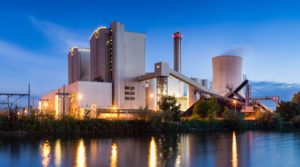 Mitsubishi Hitachi receives order to construct 5,300MW power plant project in Thailand
Mitsubishi Hitachi receives order to construct 5,300MW power plant project in Thailand
Mitsubishi Hitachi Power Systems, Ltd. (MHPS) has received a full-turnkey order for engineering, procurement and construction (EPC) of a 5,300MW natural-gas-fired power plant project planned by a joint venture between Gulf Energy Development Public Company Limited, one of Thailand’s largest independent power producers (IPP) and Mitsui & Co., Ltd. A long-term service agreement (LTSA) was also concluded. Plans call for two 2,650-megawatt (MW) gas turbine combined cycle (GTCC) power plants incorporating eight M701JAC gas turbines—the first order for this model received from Southeast Asia. The units will be installed at two generating plants both located near Bangkok, with commercial operations due to begin in 2021 and 2023, respectively.
The new power plants will be constructed in Chonburi and Rayong provinces, both approximately 130 kilometers (km) southeast of Bangkok. Each plant will have a generating capacity of 2,650MW, with natural gas serving as the primary fuel. The generated power will be sold to the Electricity Generating Authority of Thailand (EGAT) to respond to Thailand’s rapidly increasing power demand, which is rising in tandem with the country’s economic growth.
The GTCC plant will have four power trains at each generating facility, with each facility incorporating four gas turbines, steam turbines, heat recovery steam generators and generators etc. MHPS will be in charge of manufacturing and supplying the gas and steam turbines and ancillary equipment, and Mitsubishi Electric Corporation will provide the generators.
Previously, MHPS received full-turnkey orders from a company backed by Gulf Energy Development to construct GTCC plants at Nong Saeng and U Thai in 2011. Those plants began commercial operations in 2014 and 2015, respectively, and their consistent track record led to receipt of the latest order.
MHPS gas turbine combined cycle technology is among the cleanest and most efficient method of thermal power generation, since the gas turbine itself generates power and the high-temperature gas which can be used to drive a steam turbine, generating additional power. GTCC also reduces carbon dioxide (CO2) emissions by approximately 70 percent compared to conventional coal-fired systems. MHPS’s highly efficient gas turbines are a leading presence within the industry, and the J-Series in particular are the Company’s core models achieving the world’s most efficient operation. The JAC models add an air-cooled combustor to the proven steam cooled J-Series.
Going forward, MHPS will continue to focus on promoting the adoption of the latest J-Series gas turbines and GTCC plant installations as a way of contributing to the achievement of stable power, thereby supporting global economic development, efficient use of natural resources and reduction of environmental impact.
Source: Mitsubishi Hitachi Power Systems, Ltd.



